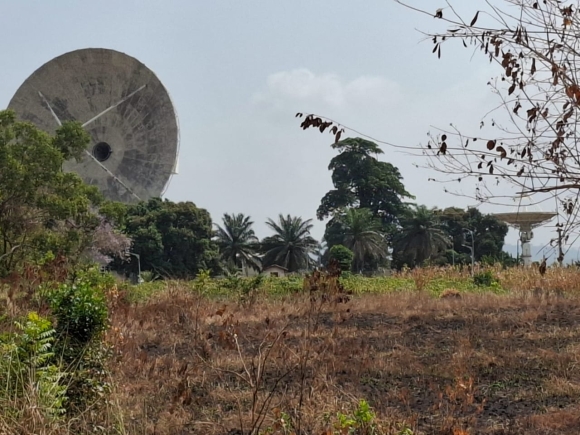
Land encroachment threatens Ghana’s space science ambitions
The Ghana Radio Astronomy Observatory at Nkutunse in the Greater Accra Region, a critical facility enabling global space research, is under threat from encroachers.
The illegal occupation of land surrounding the site is restricting the range at which the telescopes can capture and transmit images, limiting Ghana’s contribution to global space technology.
Originally covering 163 acres, the state-acquired land has now been reduced to only 30 acres, with indigenous groups threatening to invade the main facility. This has forced the government to deploy military personnel to protect workers constructing a GH¢1 million perimeter wall around the remaining land.
Despite documentary evidence from the Lands Commission confirming that compensation was paid to rightful landowners, some local youth remain defiant, insisting on reclaiming what they claim as their ancestral land.
The new security measures will see 20 acres of land enclosed with the newly built fence, complementing an earlier 10-acre defence wall funded by the American satellite communications company, Viasat, which operates a satellite facility within the compound.
Space Science Hub under threat
The Ghana Radio Astronomy Observatory, launched in 2017 by former President Nana Addo Dankwa Akufo-Addo, is the only facility of its kind in sub-Saharan Africa outside of South Africa. It houses a 32-metre radio telescope, alongside 16-metre and 9-metre telescopes, and covers a 4-8 GHz frequency range.
The observatory plays a vital role in advancing Ghanaian expertise in electronics, ICT, and space science, while positioning the country as a major player in global astronomical research. Ghana was chosen for this project over Australia, thanks to its central location and proximity to the equator, making it an ideal site for space exploration research.
Experts raise alarm over disruptions
Speaking after a tour of the encroached area, Obrimpong Toku Dum VIII, Manager of the Real-Time Earth Station under the Ghana Atomic Energy Commission (GAEC), expressed grave concerns about the impact of the encroachment on scientific work.
“Due to the encroachment, the telescopes cannot see beyond 10 minutes,” he lamented.
He explained that buildings and household appliances such as blenders and microwaves were interfering with the observatory’s ability to “see” and transmit clear data to the rest of the world.
“The encroachment has been rampant over the last seven years because of the good roads leading to the site,” he noted.
“In the early days, there was little encroachment because the road was so bad. I remember one could spend an hour from the junction to the site. But now, it takes less than 15 minutes. I think the good road has been a curse rather than a blessing to the project,” he added.
His concerns were echoed by Dr. Joseph Tandoh, Director of the Ghana Space Science and Technology Institute, who warned that failing to act swiftly could cost Ghana millions in foreign investment.
“Ghana benefits financially for allowing itself to be used as a centre for world information and contributing to space technology,” Dr. Tandoh stated.
“But we risk losing out if we don’t protect the remaining land and invest in expanding knowledge in the field,” he cautioned.
He commended the government and GAEC for their efforts in preserving the facility through enhanced security measures but stressed the need for long-term solutions to safeguard Ghana’s space science ambitions.
